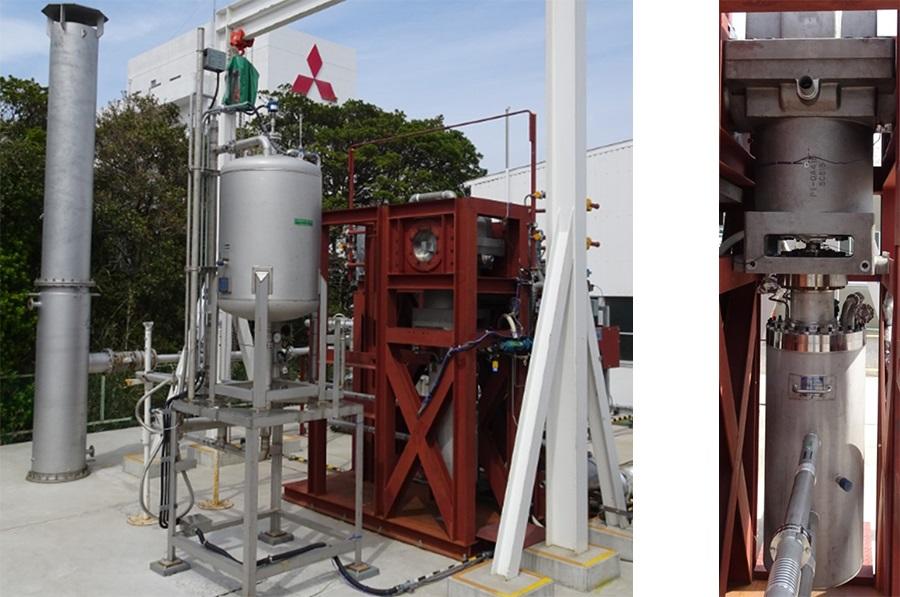Press Information
MHI Develops Ultra-high-pressure Liquid Hydrogen Booster Pump for FCV Hydrogen Stations
-- Pressure Successfully Boosted to 90MPa at Company’s Cryogenic Testing Facility --
-- Pressure Successfully Boosted to 90MPa at Company’s Cryogenic Testing Facility --
・ Boosting pressure of liquid hydrogen reduces energy consumption, easing environmental impact
・ 90MPa achieved in tandem with easy control of flow rate

90MPa-class ultra-high-pressure liquid hydrogen booster pump
(left: test configuration, right: pump unit)
Tokyo, April 6, 2021 – Mitsubishi Heavy Industries, Ltd. (MHI) has developed a 90MPa-class ultra-high-pressure liquid hydrogen booster pump for hydrogen stations that dispense hydrogen to fuel cell vehicles (FCV).
The Company succeeded in raising the pressure of liquid hydrogen(Note1) to 90MPa(Note2) in cryogenic testing facilities located at its Research & Innovation Center’s Nagasaki District.
In an FCV, the motor is driven by electrical energy generated through a chemical reaction between hydrogen and oxygen. By raising the pressure of the fuel’s hydrogen component in a liquefied state, the volume of energy consumed can be reduced compared to boosting the pressure of hydrogen in a gaseous state, helping to mitigate environmental impact in the “hydrogen society” of the future.
The newly developed pump is of the reciprocating type and features an explosion-proof motor that will not ignite even in a flammable atmosphere. To facilitate flow volume control, the motor is driven by inverter control. Also, because the pump operates in the presence of liquid hydrogen, which is a cryogenic fluid susceptible to vaporization, the inlet suction component is submerged in a vacuum insulated container. Furthermore, by raising the pressure of the liquid hydrogen booster pump to 90MPa, considerably higher than the Company’s earlier achievement of 40MPa, the new pump enables more hydrogen fuel to charge to the FCV.
The new booster pump was developed and tested based on cryogenic technologies MHI acquired through development of its liquid-fueled rockets and its LNG (liquid natural gas) technologies developed for ships. By proposing new applications for its cryogenic technologies, the Company looks to contribute to the realization of the “hydrogen society” of tomorrow.
- 1Hydrogen in a liquefied state. Approximate temperature: -253℃.
- 2MPa, i.e. megapascal: a standard international unit used in measuring pressure and stress. 1MPa = 1 million pascals (Pa). 1Pa is defined as a pressure of 1 newton per square meter. In the field of meteorology, atmospheric pressure was long measured in millibars (mbar); but with the transition to standard international units, today the term mbar has been replaced by hectopascal (hPa).
■Main specifications of the 90MPa-class ultra-high-pressure liquid hydrogen booster pump
| Discharge pressure | 90MPa |
|---|---|
| Flow rate | 1,000Nm3/h |
| Size and weight (approx.) | H 2.7m, L 1.0m, W 0.7m; 2.7t |
| Drive system | Motor (inverter control) |
About MHI Group
Mitsubishi Heavy Industries (MHI) Group is one of the world’s leading industrial groups, spanning energy, smart infrastructure, industrial machinery, aerospace and defense. MHI Group combines cutting-edge technology with deep experience to deliver innovative, integrated solutions that help to realize a carbon neutral world, improve the quality of life and ensure a safer world. For more information, please visit www.mhi.com or follow our insights and stories on spectra.mhi.com.






